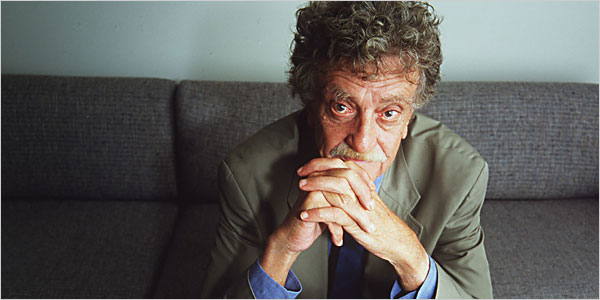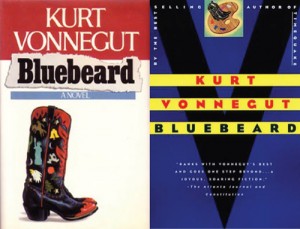© 2013 DosgoverLava, Staff Writer
Who Is Rabo Karabekian? That’s easy. He’s a character in the novel Bluebeard by the American author Kurt Vonnegut, most famous for his 1969 novel Slaughterhouse Five. An astute and often savage social critic, Vonnegut is often overlooked by academics – some who just can’t get past his easily accessible and sometimes overly familiar prose. He has a masterful facility with popular language, capturing the American idiom in both expression and context, while weaving often absurd tales through a rich tableau of popular culture and history. Sometimes crass, sometimes bombastic, Vonnegut has a meta-fictional command over his universe – one work is famous for the inclusion of a doodle of his own asshole.
Though not populated by doodles of asses or other private parts, Bluebeard is one of several Vonnegut works written as a faux first person autobiography (see also the excellent Hocus Pocus), and Rabo the character might just be Vonnegut himself, disguised not as a Man of Letters but a Man of Art. For Vonnegut’s generation, who came of age through the sober and hard domestic realities of the depression only to be baptized by war and awakened into a world where the wholesale intended slaughter of human beings by human beings had a name, you had several choices. You could dive into the faux utopian dream that defined post war America – a period of forgetting and denial where we were supposed to bath in consumer goods, birth children, and all get rich investing in plastics. Or you could turn left and embrace the counter culture of the beats, living as an exile, both savage and cynical, and opt out of any collective responsibility. Or you could do as Vonnegut did – try to stay within the culture and rail against the forgetting using humour and laughter to penetrate the denial, all the while birthing a new Humanism out of the tattered remnants of a failed paternalism.
For us Gen X’ers and some of the Millennial’s, born to the offspring of that generation of returned post-war forgettors (that offspring being our parents, the selfishly self indulgent and self centered Boomers) Rabo’s voice is hauntingly familiar. Not because we’ve heard it before, but because we know it in form by the negative space its absence left in our own familial and cultural dialogic.
He’s the long lost paternal Grandfather that’s there to remind us that the way to fight the horror is not to forget it and self-indulge, nor to run away from it or abdicate, but to remember and reflect – and to apply one’s own humanity to the memory like a treating a wound -not only to heal, but as a prophylactic to future horrors. Ultimately it’s a message of love, but love in the sober awareness of our human propensities, and the calamitous propagation of our own wills and desires. It’s a paternalism tempered by a new humanism that offers us a more authentic way to live without having to bury the past.
That’s who Rabo Karabekian is – he’s the grandfather we all needed. He’s the failed father of our fathers who has a message for us that we are uniquely poised and ready to hear. Read Bluebeard. You wont regret it, then go on to explore more Vonnegut who I think is about to undergo a new cultural renaissance.©


